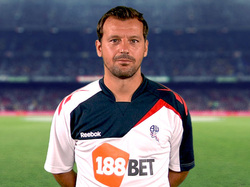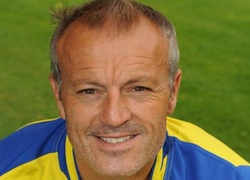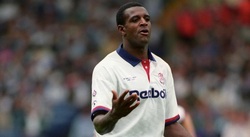
Born in Middlesbrough, England, Blake began his professional football career at Division Three side Darlington in the 1994–95 season after signing on from the youth academy. He spent the first few seasons of his career playing at Feethams, and also was loaned out to Waterford United during the 1995–96 season, making some 68 league appearances and scoring 21 goals before the club received an offer, from then Division One side, Bradford City in March 1997. Bradford made a £300,000 offer for the player which Darlington accepted
Blake quickly settled into the Bradford side and he scored eight goals in his first full season, first under Chris Kamara and then Paul Jewell. He was sent off in the final game of the 1997–98 season against Portsmouth meaning he was suspended for the start of the following season. But he forced his way back into the team and scored in his first game back in a 2–2 draw with Sheffield United. He and new signing Lee Mills forged a lethal partnership in attack sharing 40 goals. Blake scored 16 goals as City won promotion to the Premiership. Blake scored the winning goal in the final game against Wolverhampton Wanderers of the 1998–99 season to see his side finish the season as league runners-up.
However the following season was harder for Blake and he struggled to make an impact in the Premiership, starting just 15 games for Bradford, with a further 12 played as a substitute. The next season at Valley Parade began much differently for Blake after being sent on loan to the Division One side Nottingham Forest for two months, scoring once against Barnsley. Following his 2-month loan spell at Forest he returned to Bradford where he finished the season with four goals from his 14 starts in the 2000–01 season with Bradford ultimately being relegated to Division One. During the summer of 2001 former loan club Nottingham Forest made an undisclosed bid for the player which was rejected. Following the failed transfer bid Forest manager David Platt said;
"The offer was turned down, and as no further finance is available, we must assume the deal is dead" – David Platt.
This was not the last transfer offer Bradford would receive as just a few months later on 25 January 2002 the club received a £1 million transfer bid from fellow Division One side Burnley and, due to Bradford's poor financial status, the club had no option but to sell the player.
Blake signed a three-year contract with the Clarets but did not feature much in the remaining six months of the season due to a hernia injury. In his second season at Burnley Blake was the club's top scorer with 22 goals in all competitions from 46 games. That summer, long time Burnley manager Stan Ternent left the club and was replaced by Steve Cotterill and under the new manager Blake continued his prolific goal scoring with 13 goals in the run up to the January transfer window. When the transfer window opened Blake was subject of multiple bids by Premiership clubs, all of which were rejected (at first). Several bids were made by Wigan Athletic who had offers of £500,000 and £600,000 rejected. Following the failed bids Wigan manager Paul Jewell said;
"The position is that we made an offer for him and it's been turned down, it's as simple as that" – Paul Jewell.
Wigan later made a third for the player, a revised figure of £700,000. Again the Burnley board turned down this offer and no further bids were made by the Latics. In his final game of his first spell at Burnley he scored what is possibly the best goal of his Burnley career leathering in a stunning free kick from 35 yards in a local derby against Preston North End. Eventually a successful bid of £1.25 million was made by Birmingham City and Blake once again had a chance to prove himself in the top league.
Blake made his debut for Birmingham in the FA Cup against Leeds United on 8 January 2005 as a second half substitute. Blake was confident that he could push for a starting place at Birmingham saying:
"Clinton Morrison and Emile Heskey have done fantastically well, but hopefully I can push them for a place. I can play in a few positions, behind the strikers or dropping deep, and that gives the gaffer some selections to think about. I thought if anything a bottom four team in the Premiership would come in for me but Birmingham, with the quality of players they have, was an even bigger bonus." – Robbie Blake
In an interview with BBC Sport. Blake's hopes did not materialise, he went on to play just 11 games for the club and only scored two goals. During the summer of that year Birmingham confirmed that they had received an offer from Leeds United for Blake:
"We have had an offer from Leeds for Robbie Blake. We are considering it and talks are ongoing. Robbie has done very well for us, but he feels he wants to play more and at Leeds he would probably play every week" – Steve Bruce
Blake did not travel with his team mates on the pre-season tour as he was still in negotiations with Leeds and he was eventually signed for £800,000.
Blake signed a three-year deal at Elland Road and commented that although moving to Leeds was stepping back a division he was looking forward to winning promotion with his new club;
"It's a step back in terms of divisions but hopefully I can get back into the Premier League with Leeds. With the quality of players we have got, I'm sure there will be no end of goals going in." – Robbie Blake
He made his debut for the club alongside Northern Ireland striker David Healy in the first match of the 2005–06 season against Millwall and scored his first goal just two days later in the Championship match against Cardiff City at Ninian Park. He went on to make 31 starts for Leeds and finished the season with 11 goals.
Blake was one of six strikers at Leeds and was not a first team regular until the second season when Dennis Wise was appointed manager following Kevin Blackwell's departure. Blake did manage eight goals in the 2006–07 season but this was not enough to save Leeds from relegation after the club filed for administration and suffered a 10-point deduction. Following their relegation to the Football League One Leeds struggled to hang on to their players with the likes of David Healy, Richard Cresswell, Neil Sullivan and Kevin Nicholls all leaving the club.
Blake soon followed when he was re-signed by Burnley for a fee of £250,000 on 13 July 2007 and signed a three-year deal. A number of clauses on the sale meant the total transfer fee would rise to £350,000 after 40 games and also included a further payment if Burnley were to be promoted.
With Blake back at his old club, manager Steve Cotterill revealed that Blake felt he had "unfinished business" with the club and that the player needed no persuasion to sign the deal. Burnley director Brendan Flood also revealed that Burnley had been working on a deal for a couple of weeks prior to the announcement:
"With strikers, once it gets mooted that they may be on the move, it invites others to join the hunt. Being able to keep it under wraps is therefore vital, otherwise you get competitive bids coming and the price spirals. Robbie is a proven entertainer and one of the top strikers in the Championship and we know he is always going to score goals. But the really important factor is that he is happy and keen to play for Burnley." – Brendan Flood
Blake made his return debut for the club on 11 August 2007 in the opening fixture of the 2007–08 Football League Championship season against West Bromwich Albion which Burnley won 2–1. He then scored the first goal of his second spell with the Clarets in the League Cup game against Oldham Athletic. He was heavily praised by both his and other managers as well as the press for his excellent form at the start of the 2007–2008 season, most notably for his performance in the 1–1 draw against Crystal Palace just days after the birth of his daughter Mia. Blake finished the season with 10 goals and 14 assists in 43 matches.
Blake came close to helping Burnley into the 2009 League Cup final by scoring one goal and making two more in the second leg of the side's semi-final against Tottenham Hotspur. The goals put Burnley just two minutes away from the final, before Tottenham scored twice in the final two minutes to reach the final on aggregate.
Blake returned to the top flight once again in May 2009, this time with Burnley after they beat Sheffield United 1–0 in the play-off final at Wembley. A match which Blake played in. Blake scored his first Premier League goal since 2005 on 19 August 2009 against the defending Premier League champions Manchester United, in a 1–0 win. This was Burnley's first home game in the top flight of English football for 33 years
On 30 June 2010, it was announced that he had signed for Bolton Wanderers on a free transfer and would officially join the club a day later. He made his debut for the Wanderers in their 3–1 win over West Ham United at Upton Park on 21 August and scored his first goal for the club eight days later in the home game against former employers Birmingham City with a free kick that earned Bolton a 2–2 draw. As the season drew on, Blake became less and less involved in the first team and several clubs showed interest in signing him on loan, but the player decided to stay and fight for his first team place. At the end of the season, the club decided to take up the option on extending his contract for another year. However, at the end of the following season, following Bolton's relegation from the Premier League, Blake was released. He made only three appearances in his second season with only one of them in the league, on the opening day of the season.
On 27 June 2012, it was announced that Blake had signed a one-year deal for Doncaster Rovers on a free transfer. After two League Cup starts and several appearances from the bench, he scored his first goal for Rovers on 1 December 2012 in an FA Cup game at Oldham Athletic. With no appearances since January, Blake's contract was terminated by mutual consent on 25 March 2013, with him having scored once in 14 appearances for the club.

Born in Dewsbury, West Riding of Yorkshire, Redfearn began his career at Bolton Wanderers in 1982, having previously been on the books of Nottingham Forest's youth team. He later made his name as a goalscoring midfielder at lower-division sides Lincoln City and Doncaster Rovers. In May 1985 he was to witness a nightmare when 56 spectators were killed in a horrendous stand fire while playing for Lincoln against Bradford City. In 1987, he was signed by Crystal Palace for £100,000, and he later played for Watford, before moving again in 1989 to Oldham Athletic.
Redfearn's last season with Oldham constituted a career highlight as he was an ever-present in the team that won the Second Division title and returned the Latics to the top-flight of English football after a gap of 68 years. Redfearn converted the injury time penalty kick in the final game of the season against Sheffield Wednesday that completed a 3–2 victory (after Oldham had trailed 2–0), and snatched the championship from West Ham United, who had prematurely been handed the trophy some 15 minutes earlier. Despite his contribution to Oldham's promotion, he became surplus to requirements with the re-signing of former club captain Mike Milligan from Everton in the off-season and Redfearn was transferred without playing for Oldham in the top flight.
In September 1991, Redfearn joined Barnsley, and it was at this club he arguably spent his prime years. In his seven seasons at Oakwell, he hardly missed a single game, and was named club captain and penalty taker. In the 1996–97 season, Redfearn scored 17 goals as Barnsley won promotion to the FA Premier League for the first time in the club's history. Redfearn missed only one game, and was Barnsley's top scorer with ten league goals in the 1997–98 season. These included Barnsley's first ever top division goal on the opening day of the season, when he put them ahead in the ninth minute at home to West Ham United, although they ended up losing the game 2–1.
It was not enough to save them though, as Barnsley were relegated that season. However, despite being in his thirties, Redfearn's performances had made him a wanted man in the Premier League, and he was signed by Charlton Athletic for £1 million in the summer of 1998. He left Barnsley having played 338 first team games, scoring 84 goals.
In the 1998–99 season, his family did not settle in London, and at the end of the season, Redfearn jumped at the chance of returning to his native Yorkshire, when Bradford City paid £250,000 for his services. Redfearn did not make much impact at Bradford, scoring just once against Leicester City, and joined his 10th team, Wigan Athletic after just nine months in Bradford. Despite a very good goalscoring record, Redfearn never became first-choice at Wigan either, and he dropped down two divisions to join Halifax Town in 2001.
At Halifax, he also got his first taste of management, being appointed caretaker manager alongside Tony Parks following the resignaton of Paul Bracewell on 30 August. His spell as caretaker manager came to an end on 12 October following the appointment of Alan Little. Redfearn started a second spell in caretaker charge on 4 March 2002 due to the enforced absence of Little. However, his contract with the club was terminated on 25 April and having been snubbed for the permanent manager's job he joined Boston United as player-coach.
Redfearn spent the better part of two years at Boston, before finishing his Football League career at Rochdale in the spring of 2004. Rochdale did not offer him a new contract at the end of the season, meaning he finished his Football League career with 790 appearances and so being fifth in the all-time list of most Football League appearances

Cunningham, a striker, began his professional career with Lincoln City in 1979. In three years with the Imps, he made 123 league appearances and scored 32 goals.
Barnsley came in for his services in 1982, and he went on to make 42 appearances for the South Yorkshire club, scoring eleven goals.
After leaving Oakwell, Cunningham remained in the White Rose county, making 28 appearances and scoring five goals for Sheffield Wednesday.
In 1984 Cunningham had a short spell with Manchester City before moving to the North East to join Willie McFaul's Newcastle United. He spent two years on Tyneside, making just short of 50 appearances for the Magpies, scoring four goals.
Cunningham traded the North East for the North West in July 1987 when he signed for Sam Ellis' Blackpool for a tribunal-set fee of £25,000. He made his debut for the Seasiders in the opening day of the 1987–88 season, a draw at Gillingham.
What started as a promising Blackpool career became a disappointing one. As the team struggled, Cunningham was made a scapegoat, and at the end of the 1988–89, he rejoined Ellis, who had become manager of Bury.
On his return to Bloomfield Road with the Shakers, on October 31, 1989, Cunningham delighted the home support by getting sent off in the first half. The visitors, however, won the game by a single goal.
After Bury, Cunningham played for Bolton Wanderers, Rotherham United, Doncaster Rovers and Wycombe Wanderers. After almost 500 league games and over one hundred goals, he ended his career with non-league Gainsborough Trinity.
Other players include - Diouf, Mike Jeffrey, Dennis Peacock and Neil Redfearn.
Author: Sluffy


 RSS Feed
RSS Feed
